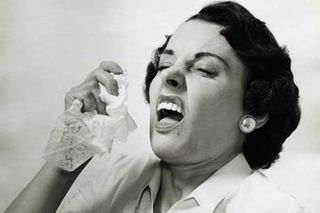
Why Sneezing Is So Weird
Why can some people never sneeze just once, and some have trouble sneezing at all?

Sneezes constitute a myriad of exciting sensations — the build-up, the anticipation, the release, even the occasional let-down — making them one of the more interesting, feel-good bodily mechanisms.
The process of sneezing is quite straightforward: when there is an irritant in the nasal cavity, such as dust, dirt, smoke, or mucus from a cold, the lining of the nostril experiences a tingle, which it communicates to the brain via nerve endings present in the region. The brain sends an urgent signal to expel these particles — the lungs provide the impetus with a massive inhalation; the nose facilitates the initial heave; the eyes snap shut; the body’s muscles tighten in anticipation of the impending (often violent) event — ultimately culminating into a sneeze.
But, sneezes can have triggers unrelated to the nasal lining. Photic sneezing, for example, is a sneeze response to looking at bright lights, which may have to do with a cross-wiring in the brain between the nerves associated with relaying the sneeze response to the brain and the optic nerve. People have also been known to sneeze while applying mascara or plucking their eyebrows, Self reported. According to the U.S. Library of Medicine, some people might also sneeze when they feel strong emotions.
But, this delightful occurrence doesn’t roll around that often, and many a time, it’s quite disappointing, or jarring, or simply ineffective. For such a simple bodily function, sneezes are quite complicated.
What causes multiple sneezes?
Sneezes often occur in threes, tens, and twenties — leaving the throat all scratchy and the body fully jolted out of equilibrium. Multiple sneezes occur when your body’s sneezing mechanism is ineffective. It’s just not doing the one job it has — to expel nasal irritants.
“Depending on how her nerves are hardwired, it may mean her sneezes are not as forceful to expel whatever is irritating her,” Dawn Zacharias, an allergist at University Hospitals Case Medical Center in Cleveland, told Popular Science. “If that’s the case, try to rub your nose or plug your nose. That way you can manually remove the allergen.”
People with allergies, on the other hand, don’t necessarily have slow nerves, but can physically not escape the allergens in their surroundings making them sneeze.
What causes the almost-sneeze?
When the nose gets irritated, one can almost feel the electrical signal progressing up to the brain, which leads to one tensing up in anticipation, perhaps even scrunching up their face in wait, and then … nothing. The sensation simply goes away, leaving the person high and dry. Almost-sneezes, as I like to call them, are a weird, often embarrassing phenomena — so, what gives?
Related on The Swaddle:
Can You Take Allergy Medication Every Day Long-Term?
It turns out, almost-sneezes are for those with confused nerves. If the nasal irritant’s ability to irritate the nasal lining reduces — perhaps due to a deep breath that moves around the irritants so they don’t tickle as much, or because the body becomes distracted with another chore or thought, the nerves responsible for telling the brain to incite a sneeze response become unsure of what to do, with the electrical signal essentially getting lost in transit. Hence, the slight inclination to sneeze might linger, but the final push that’s needed for the big finish never comes. They’re the worst.
“You’re at a sub-threshold,” which makes sneezing in response to the sub-par irritation “not worth it,” the New York Post reports.
What does sneezing have to do with orgasms?
Well, not much, unfortunately. For some, the release of sneezing might feel comparable to how an orgasm feels, although nowhere near as pleasurable. While there exists a popular myth that sneezing feels like one-tenth of an orgasm, it’s just that: a myth. However, humans’ nasal cavities contain erectile tissue responsible for the blocking of nasal airways, as it facilitates the engorging of blood vessels present in the nasal cavity that block air passage during a cold, for example. When erectile tissue in one nostril tenses up, that in the other nostril relaxes, which helps in breathing.
The relief accompanying a sneeze “has to do with the erectile tissue in the nose, and how that relaxes once you’ve sneezed,” Alexis Jackman, M.D., of the New York-based ENT and Allergy Associates, tells New York Post.“You have a hypersensitivity, and it builds and builds and builds, and then you relax … We are conditioned for that release. Your body solved a problem.”
Live Science reports that sneezing can also release endorphins for some people. Researchers have also found some people have a tendency to sneeze when they’re aroused, Live Science reports: “Doctors suspect that the phenomenon might arise from a case of crossed wires in the autonomic nervous system, which regulates a number of automatic functions in the body, including ‘waking up’ the genitals during arousal.”
On that note: enjoy your nose erections while you can. Research shows the increase in air pollution is leading to an increase in the development of allergies in people. It’s likely we’re going to be pretty sick of sneezes soon enough.
Rajvi Desai is The Swaddle's Culture Editor. After graduating from NYU as a Journalism and Politics major, she covered breaking news and politics in New York City, and dabbled in design and entertainment journalism. Back in the homeland, she's interested in tackling beauty, sports, politics and human rights in her gender-focused writing, while also co-managing The Swaddle Team's podcast, Respectfully Disagree.
Related


A New Study in India Links Air Pollution to Weaker Bones
